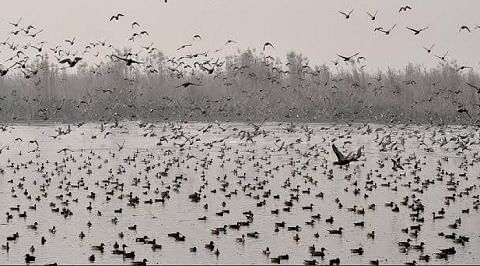Judicial urgency as High Court probes the current status of the 7 Ramsar wetlands in Jammu & Kashmir, Ladakh.

In a significant move, the High Court has issued an urgent directive demanding the current status of the seven wetlands in Jammu & Kashmir and Ladakh that have been declared Ramsar sites. The directive comes amidst growing concerns about the preservation and conservation efforts for these crucial ecosystems, which are vital not only for the region's biodiversity but also for the sustenance of local communities.
The seven wetlands in question—Hokersar, Wular Lake, Tsomoriri, Tsokar, Brackish Water Lagoon, Surinsar-Mansar, and Laharwalpora—have been designated as Ramsar sites due to their international importance as habitats for various species of flora and fauna. The Ramsar Convention, an international treaty signed in 1971, aims to protect and conserve wetlands globally.
The High Court's intervention is sparked by reports of potential threats to these Ramsar sites, ranging from encroachments to changes in water quality and habitat degradation. The status update request aims to assess the efficacy of existing conservation measures and to prompt timely corrective actions if required.
Concerns about the impact of climate change on these fragile ecosystems have heightened the urgency of the High Court's inquiry. The melting glaciers, altered precipitation patterns, and rising temperatures pose direct threats to the water levels and biodiversity of these wetlands. The court seeks a comprehensive report on the measures in place to mitigate these climate-induced challenges.
Environmentalists and local conservationists welcome the court's proactive stance, emphasizing the need for a collaborative approach involving government bodies, NGOs, and local communities. These wetlands not only provide crucial habitat for migratory birds but also play a pivotal role in maintaining the ecological balance of the region.
While the Ramsar Convention provides a global framework for wetland conservation, effective implementation at the local level is paramount. The court's intervention underscores the need for a thorough evaluation of the current conservation strategies and their alignment with international standards.
Government authorities responsible for the oversight of these wetlands are expected to submit a detailed report to the High Court within the stipulated timeframe. The court has emphasized the importance of transparency and accountability in this matter, signaling a commitment to ensuring the long-term sustainability of these Ramsar sites.
In conclusion, the High Court's intervention serves as a timely reminder of the critical importance of preserving and protecting our natural ecosystems. As climate change poses unprecedented challenges, collaborative efforts and proactive measures are essential to safeguarding these Ramsar wetlands for future generations. The outcome of the court's inquiry will likely have far-reaching implications for wetland conservation not only in Jammu & Kashmir and Ladakh but also as a precedent for similar initiatives globally.